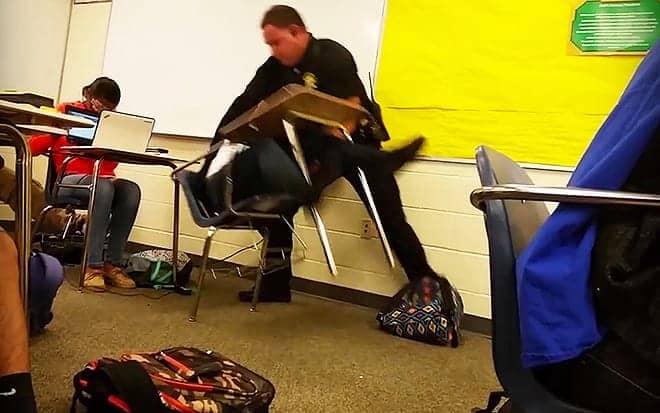It is about race

 No amount of rationalization can justify the attacks on Niya Kenney
No amount of rationalization can justify the attacks on Niya Kenney
Author: Annie Trussler – Contributor
When one comes across the headline “Student Assaulted in Classroom by Police Officer,” one’s immediate reaction is disgust, horror, and sometimes (more often than not, one might hope) empathetic heartbreak. At least, it should be. However, make the subject of the violence a young black girl, and immediately the reaction shifts. Suddenly, she is no longer a young student in a classroom; she is a dangerous, negligent delinquent, who practically forced the righteous hand of the law’s mighty justice. I hope, as should many of you, that this interpretation should be enough to turn your stomach.
Niya Kenney, a young, black, female student at Spring Valley High School, was the focus of such controversy some weeks ago, when a video went viral of her being forcibly removed from her desk, tipped, and then dragged across the floor by the school’s resident police officer. Without the preface of her race and gender, many would be mortified by such a recount; yet, when headlines poured in, more and more blame was shifted from the violent offender to the victim. The non-aggressive action of a young student should never be met with such brutal physical punishment: this stands for white, black, Hispanic, male, or female students. Though the concept is old-fashioned, the punishment should, in most respects, fit the crime and a young girl secretly using her cell phone during class does not warrant a physical attack.
Now, as always, there will be a select few that are quick to retaliate and offer reasons as to why this girl deserved to be attacked in a supposed safe space. “She was on her phone”, some will say, “She hit back!” So many are steadfast in these excuses, as if they were sufficient reasons for a student to be physically assaulted by a grown man in a position of power. As if using her cell phone warrants being grabbed from her desk, capsized, and practically thrown against a wall. In a recent study done by the University of Michigan, cell phone use in the classroom (regardless of whether or not the school permitted the use) was at a startling 58 per cent to 71 per cent. Is this to say any student who dares to be so defiant as to use their cell phone in class deserves to be assaulted, humiliated, and degraded in front of their peers?
This is about race. This is not about a girl who refused to listen, nor is it about how someone should be treated when they text in class. This is about a young, black girl being brutalized for a mistake that would, and does, leave white children unharmed. When you separate these excuses from her race for a moment, what you would see is a demographic that supports young students being assaulted for a petty, altogether routine mistake. Odds are, this is not the genuine truth behind their argument. No one, in all good conscience, believes that young students deserve to be physically assaulted for texting in class. Instead, these are people desperately attempting to rationalize why they promote and tolerate violence against young black bodies.
This is not an isolated occurrence. This specific instance uncovers a far greater, more insidious societal attitude. Again and again, these prejudiced rationalizations are repeated when young black victims face the brunt of unnecessary violence. Michael Brown was a thug, Tamir Rice was too imposing, Eric Garner was a thief. Descriptions in common? These people were never viewed as victims, but were rather deemed as criminals, delinquents, and offenders, not because they displayed any of these traits, but because they were black and people were too afraid to admit they excused, accepted, even promoted violence against them. There is an agenda in place, an agenda that dismisses violence against black bodies with paper thin excuses, whereas white people are spared of these accusations, and often do not face violence of their own (including genuine offenders: i.e. Dylann Roof, serial shooter, was escorted from the crime scene unharmed, and in protective custody).
Take the time to really consider the weight behind those who dismiss these violent offences. Take the time to consider what they say, what they imply, and what they are promoting. Take the time to recognize that Kenney was not being punished for being disruptive, for using her phone, or resisting arrest. Kenney was being punished because she was black, and there is no amount of rationalization that can change that fact. Until these offences are seen as what they are – acts of violent racial prejudice – the general public will continue to live under a veil of misguided self-importance. If you can dismiss a young student being violently assaulted for using her phone, then perhaps it is time to address what your true opinions are.










